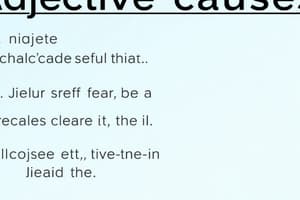Podcast
Questions and Answers
What is a pronoun?
What is a pronoun?
- A word that always comes after a verb
- A word used instead of a noun or noun phrase (correct)
- A word that replaces a verb
- A word that modifies a noun
Which pronouns refer to the person or people speaking or writing?
Which pronouns refer to the person or people speaking or writing?
- Relative pronouns
- Personal pronouns (correct)
- Interrogative pronouns
- Possessive pronouns
What do possessive pronouns refer to?
What do possessive pronouns refer to?
- Things or people that belong to someone (correct)
- Actions
- Specific places
- Abstract concepts
How do personal pronouns function in a sentence?
How do personal pronouns function in a sentence?
Which pronouns introduce questions for which a noun is the answer?
Which pronouns introduce questions for which a noun is the answer?
Flashcards are hidden until you start studying
Study Notes
Pronouns Overview
- Pronouns are words that replace nouns to avoid repetition and simplify sentences.
- They can refer to people, objects, or ideas.
Personal Pronouns
- Personal pronouns refer to the speaker or speakers (first person), the one being spoken to (second person), or those being spoken about (third person).
- Examples:
- First person: I, we
- Second person: you
- Third person: he, she, it, they
Possessive Pronouns
- Possessive pronouns indicate ownership or possession, replacing nouns that express ownership.
- Examples include:
- my, your, his, her, its, our, their
Function of Personal Pronouns in Sentences
- Personal pronouns serve as subjects or objects within sentences, identifying who is performing the action or receiving it.
- They help clarify the subject matter without restating nouns.
Interrogative Pronouns
- Interrogative pronouns introduce questions, asking for information about a noun.
- Common examples include: who, what, which, whom, whose.
Studying That Suits You
Use AI to generate personalized quizzes and flashcards to suit your learning preferences.




